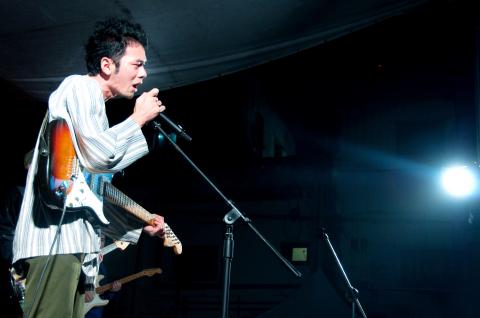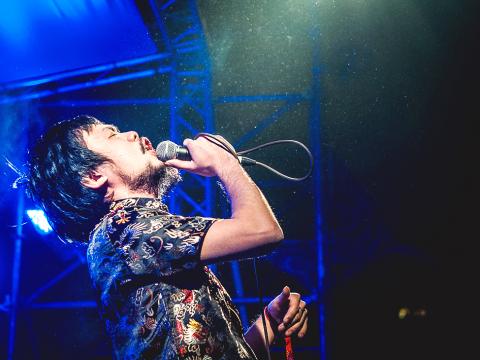Congratulations to Revolver for becoming the best, friendliest and most scene-supportive live house in Taiwan. The bar celebrates its third anniversary on Saturday, and an excellent lineup of bands and DJs is free. Let me also congratulate GigGuide.tw for holding on a while longer and continuing to service Taiwan’s rock scene. The site will hold a fundraiser at Revolver tonight with four very good bands. It is a worthy cause.
Gig Guide was founded on Christmas Eve 2008 by New Zealand Web designer Steve Leggat, who is also a serious music enthusiast. The site, which is completely bilingual, has in the last five years listed 6,229 gigs and 208 reviews, articles, interviews and photo reports. Leggat almost shut it down a couple months ago, as the money and time put into updates, translation and site maintenance was more than he and a skeleton, volunteer staff could handle. The shutdown announcement brought offers of help from live houses, record stores, bands and others who had reaped the little Web site’s benefits. So call it a Christmas miracle. Gig Guide has relaunched, and tonight’s fundraiser could begin a string of shows promoted under its own banner. The site registers over 21,000 visits per month.
Call these a couple of bright spots in an otherwise bleak cultural landscape. Not long after Franz Ferdinand’s show two weeks ago, a long-time rock geek acquaintance told me he had purposely skipped the show, not just because it was expensive — advance tickets had cost NT$2,600 — but specifically because the Taipei ticket price was almost 30 percent more expensive than the Japanese ticket price. Even though Taiwan’s average income is about half that of Japan’s. Taiwan’s price was in fact the most expensive Franz Ferdinand ticket on the band’s recent Asian tour, which also included Tokyo, Osaka, Malaysia and Hong Kong.

Photo courtesy of Steve Leggat
High concert prices are the new norm in Taipei’s rock scene, and it is hard to go to a show without hearing some grumbling. Last week after Mac DeMarco played (at The Wall, 這牆), several Taiwanese kids asked me if I thought it had been worth the NT$1,000. It had surely been fun. DeMarco has a goofy, don’t give-a-fart attitude, his bass player filled song breaks with Mike Meyers style comedic banter, and for an encore the band played an ironic, Tenacious-D-esque medley of classic rock tunes from Bachman Turner Overdrive’s Takin Care of Business to the Beatles, Rammstein and Led Zeppelin. In an over-serious music scene, it was a breath of fresh air. But to answer the kid’s question, no, the price of admission was not worth it on my pathetic freelance wages. Mac DeMarco is the kind of band you see at a college party while waiting in a keg line and has few memorable original tunes. In North America or Europe it would cost half the price. (A recent Toronto gig cost C$15.50, or NT$434) Only in Asia would it cost this much.
Usually, touring bands have no idea what local tickets cost. While watching Mac DeMarco, a couple Canadians claimed to have spoken with members of Pains of Being Pure at Heart at that band’s Taipei show earlier this year and found that group members had been “bummed to find that their Taipei show cost 50 or 60 bucks [USD].” And of course who can forget the irony of Thurston Moore last year, playing for 1,000 Taiwanese paying NT$3,000 each, and flippantly making this offer: “I’ll go play in your basement.”
The problem is, it is precisely the basements of Taipei’s rock scene that are dying. Taipei’s most firmly established basement club of the last two decades, Underworld, was shut down by the city last year for no good reason. Now another underground club, Pipe, is in danger of getting gentrified out of business because the city sublet its building to a gigantic cement company. If Pipe cannot afford its new, higher rent, Revolver will remain as the city’s last home for underground rock. It will also be the only Taipei live music venue where people actually hang out, socialize, talk, drink and generally enjoy themselves.

Photo courtesy of Steve Leggat
Compare this to Taipei’s two larger live houses, The Wall and Legacy, where patrons are generally required to pay NT$1,000 to NT$3,000 for two hours of music before they are shooed out the door and sent home. It is no wonder that rock comes off as an elitist, nerdy niche market and has failed to steal fans away from the mainstream of Mandopop. By comparison, even dance clubs and electronic music parties present much better value. For NT$600, you can spend an entire night in a blinged-up, all-you-can-drink dance club, and even if the music is top-40 hip hop, you will at least probably talk to a member of the opposite sex. Or you could pay NT$2,600 to stand like a robot for 80 minutes and watch Franz Ferdinand so you can post photos of it on Facebook later that night. Up to you.
Not so incidentally, The Wall celebrated its tenth anniversary last month, though not with a party or musical performance. It celebrated with a press release. The Wall runs four venues throughout Taiwan and annually hosts 600 performances, including 100 by international artists. Total attendance at all the events is around 50,000.
“The dream of The Wall’s team has gradually come to reality. We have grown year-by-year together with the scene,” said the statement. “Next year, we will join with a Japanese partner in a strategic alliance to create a more solid and robust networked platform, and rise together with Taiwanese music lovers up to a new level.”
So after a decade of hard fought organic growth, The Wall has now entered into the realm of corporate doublespeak.
Or in government terms, The Wall has become a “commercial and creative industry.” I do not blame The Wall exclusively for its unfortunate transformation. It is only trying to survive in a business environment that demands that it be just that, a business with enough scale and political clout to protect itself from city councilors, cement companies and other unforeseen threats. Other culture sectors are changing in the same way. If you don’t believe me, drive by the Huashan 1914 Cultural and Creative Park this weekend, where you can admire the two-meter-tall MaCallan logo that stretches across the entire front lawn of what used to be an artists’ squat.
■ Tonight at 9pm, GigGuide.tw Benefit Gig, with Hang in the Air (盪在空中), Sleaze (湯湯水水), BHD and Midnight Ping Pong (午夜乒乓) at Revolver, 1-2, Roosevelt Rd Sec 1, Taipei (台北市羅斯福路一段1-2號). Admission is NT$300.
■ Tomorrow at 10pm, Revolver Three Year Anniversary with bands Dronetonics, Forests (森林), Macbeth (馬克白) and DJs Sorry Buttons, Geometer, Translation and Marcus Aurelius & Dopplerr. Admission is free.

June 23 to June 29 After capturing the walled city of Hsinchu on June 22, 1895, the Japanese hoped to quickly push south and seize control of Taiwan’s entire west coast — but their advance was stalled for more than a month. Not only did local Hakka fighters continue to cause them headaches, resistance forces even attempted to retake the city three times. “We had planned to occupy Anping (Tainan) and Takao (Kaohsiung) as soon as possible, but ever since we took Hsinchu, nearby bandits proclaiming to be ‘righteous people’ (義民) have been destroying train tracks and electrical cables, and gathering in villages

Swooping low over the banks of a Nile River tributary, an aid flight run by retired American military officers released a stream of food-stuffed sacks over a town emptied by fighting in South Sudan, a country wracked by conflict. Last week’s air drop was the latest in a controversial development — private contracting firms led by former US intelligence officers and military veterans delivering aid to some of the world’s deadliest conflict zones, in operations organized with governments that are combatants in the conflicts. The moves are roiling the global aid community, which warns of a more militarized, politicized and profit-seeking trend

The wide-screen spectacle of Formula One gets a gleaming, rip-roaring workout in Joseph Kosinski’s F1, a fine-tuned machine of a movie that, in its most riveting racing scenes, approaches a kind of high-speed splendor. Kosinski, who last endeavored to put moviegoers in the seat of a fighter jet in Top Gun: Maverick, has moved to the open cockpits of Formula One with much the same affection, if not outright need, for speed. A lot of the same team is back. Jerry Bruckheimer produces. Ehren Kruger, a co-writer on Maverick, takes sole credit here. Hans Zimmer, a co-composer previously, supplies the thumping

Dr. Y. Tony Yang, Associate Dean of Health Policy and Population Science at George Washington University, argued last week in a piece for the Taipei Times about former president Ma Ying-jeou (馬英九) leading a student delegation to the People’s Republic of China (PRC) that, “The real question is not whether Ma’s visit helps or hurts Taiwan — it is why Taiwan lacks a sophisticated, multi-track approach to one of the most complex geopolitical relationships in the world” (“Ma’s Visit, DPP’s Blind Spot,” June 18, page 8). Yang contends that the Democratic Progressive Party (DPP) has a blind spot: “By treating any